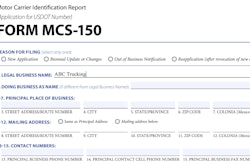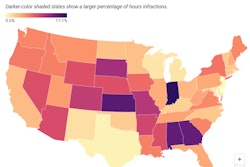 Follow this link to access the full text of the Department of Labor's final rule on contractor/employee status for fair-labor-law purposes. If you missed Part 1 of this series, which featured owner-operator perspectives on the new rule, access it via this link.
Follow this link to access the full text of the Department of Labor's final rule on contractor/employee status for fair-labor-law purposes. If you missed Part 1 of this series, which featured owner-operator perspectives on the new rule, access it via this link.
While there are plenty of opinions among those in trucking as to what makes an owner-operator truly an "independent contractor," it's easy to forget that new United States Department of Labor guidance on worker classification applies quite narrowly.
Attorney Greg Feary, president and managing partner of transportation law firm Scopelitis, believes the new six-factor classification test to be more employee-leaning than independent contractor-leaning, though application will ultimately come down to the case-by-case basis that Owner-Operator Independent Drivers Association President Todd Spencer urged in the first part of this Overdrive examination of the new rule.
Feary pointed out that the majority of decisions in the United States for decades have deemed leased owner-operators as independent contractors. And keep in mind that the DOL rule is only relevant to classification for purposes of the Fair Labor Standards Act's requirements for employers. Cases where the soon-to-be-codified six-factor test applies will be wage and hour (minimum wage and overtime) disputes. The IRS has its own multi-factor balancing test when it comes to taxes, the National Labor Relations Board another test applied when questions related to collective bargaining and working conditions are in play.

“Under the two areas of law that FLSA governs, one isn’t relevant” to trucking, Feary said, given the long-in-place overtime exemption, “and the other in the matter of trucking reality is not a problem. Most contractors in heavy trucking get paid far above minimum wage.”
Attorney Paul Cullen Jr., in a recent meeting of FMCSA’s Truck Leasing Task Force, echoed Feary’s assessment about the rule’s applicability to trucking.
“With regard to the Department of Labor rule, it's complicated not just because the test is multi-capacity and requires a judgment call in consideration of the various factors," he said. "But that test that they created is for enforcement of the Fair Labor Standards Act. Overtime, minimum wage, etc. It doesn't necessarily govern in other circumstances. It may govern in terms of determining whether a truck driver ... is an employee for purposes of minimum wage.”
[Related: Lease-purchase task force zeroes in on restrictive maintenance convenants]
Feary agreed with the overarching theme of owner-operators' own perspectives on the independent contractor status -- that the control factor does and/or should weigh heavily. From the legal perspective, Feary noted it's one thing each of the tests previously mentioned has in common: the “nature and degree of control” factor, critical in determining classification.
“It looks to see if the motor carrier has control over the daily details of the work being done,” Feary said. Importantly in the new DOL rule, "exempt from that analysis is control associated with compliance with the law. If we’re looking at what the motor carrier is asking the contractor to do, and it’s specifically compliance with a law, rule, regulation or ordinance, that’s not supposed to be weighed by a court as indicative of controlling the contractor to the point that he’s an employee -- they’re supposed to ignore that.”
In other words, any requirements put in place by a motor carrier that have to do with the contractor's regulatory compliance don’t have any bearing on how that worker is classified.
Interestingly, that standard is one the Biden Administration’s proposed contractor rule changes in 2023 sought to jettison. As Feary summarized it, the Biden proposal said that “just because a worker is in a highly-regulated industry with many laws and regulations -- like trucking -- doesn’t mean as a court we should ignore the compliance control. If we see a motor carrier is seeking compliance with these various laws, we can use that to interpret that the motor carrier is controlling the driver to the point that he’s an employee."
That would have been a big deal in trucking from the control perspective. It would also have been contrary to precedent. In the DOL's final rule, though, a carrier ensuring compliance with laws and regulations is not indicative of employee status.
Another change from the proposal would have been that driving was not considered a skilled occupation. Scopelitis went to lengths to point out that “getting a CDL requires a level of skill, and the final rule recognizes that it is a skill that would count toward contractor status,” Feary said.
One other change made in the final rule involved the “opportunity for profit or loss” factor. The proposed rule said that just because a driver accepts or rejects a load, that wasn’t important to the opportunity for profit or loss. The final rule, however, says the opposite. “It recognizes that for a truck driver to evaluate whether they are going to accept or reject a load may have a lot to do with whether there is profit or loss associated with taking that load,” Feary added.
[Related: Recognize the skill that goes into truck driving, pay accordingly]
Up in the air: How courts will weigh permanence, exclusivity of leasing relationships
One point of contention that will have to be determined by courts is the question of lease exclusivity in the context of the permanence factor, particularly for one-truck owner-operators. The rule weighs in favor of employee status when the work relationship is indefinite in duration, continuous or exclusive of work for other employers. It weighs in favor of independent contractor status when the work relationship is definite in duration, non-exclusive, project-based, or sporadic based on the worker being in business for themself and marketing their services or labor to multiple entities.
The federal leasing regulations also weigh in on exclusive possession and responsibilities when it comes to leasing agreements. In 49 Code of Federal Regulations Section 376.12(c)(1), the carrier leasing the truck from an owner-operator "shall have exclusive possession, control, and use of the equipment for the duration of the lease." Additionally, the carrier the truck is leased to "shall assume complete responsibility for the operation of the equipment for the duration of the lease."
However, subpart (4) under that same section states that nothing in the above paragraph "is intended to affect whether the lessor or driver provided by the lessor is an independent contractor or an employee" in classification disputes. "An independent contractor relationship may exist when a carrier lessee complies with 49 U.S.C. 14102 and attendant administrative requirements."
[Related: Trucking law: Your rights under the leasing regulations]
Feary said that based on federal leasing regulations, for a one-truck operator who leases on with another carrier, that truck becomes the motor carrier’s truck while the lease agreement is in place. A quality motor carrier, Feary noted, would not prohibit a contractor from getting work from outside their business and would allow for trip leasing.
In a similar vein, a small fleet with multiple trucks could theoretically lease each truck to a different carrier, meaning that business’ work is not exclusive to just one carrier.
Ultimately, Feary said it “remains to be seen how the administrative law judges within the Department of Labor interpret” the regulation. From there, if a decision from DOL is appealed into the court system, it will be up to the courts on whether or not they defer to how the DOL interprets the case, or if the court uses its own interpretation.
“There is a movement in a lot of courts to give less deference to administrative determinations and rules and to determine based on their own case law, and not necessarily defer to an agency’s rules,” he added. “Depending on which party is in the White House, agencies change” how they interpret different regulations. “There has been a significant federal court trend towards giving less deference to agency rules and using their own court to make determinations.”
Under the Labor Department’s final rule, given that it’s a multi-factor balancing test and not a strict ABC test, “I don’t see the government coming in and saying one-truck owner-operators are now employees,” Feary said. But “we’ll have to wait and see how the law develops. It will take a number of years for the law to develop in one direction or another.”
[Related: OOIDA cautions Senate against PRO Act legislation]










